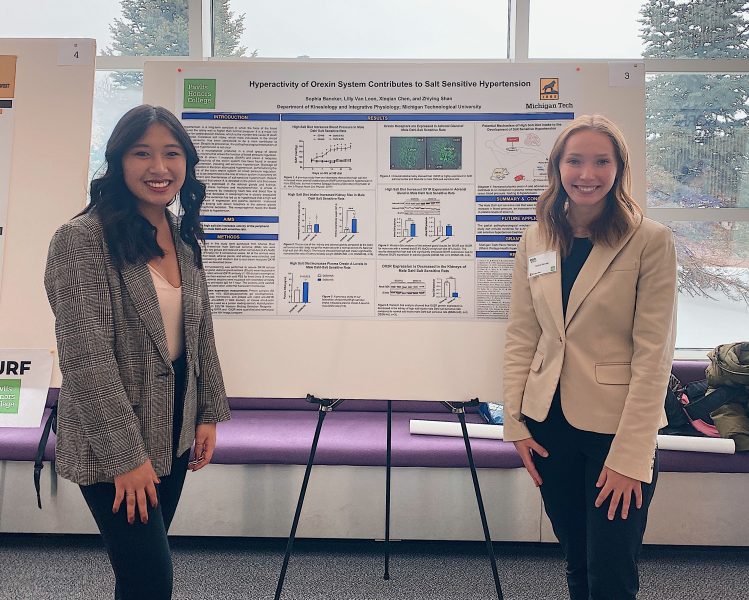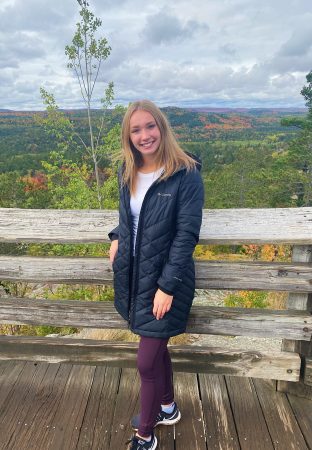Research helps Sophia Bancker complete her goals
Sophia Bancker wanted lab experience. Along with her medical laboratory science (MLS) major and minors in international Spanish and public health, it was an important step on the journey to graduate school. So when Dr. Zhiying (Jenny) Shan asked for undergraduate students to do research and Sophia saw a fit with her schedule, she did not hesitate to raise her hand. This is not surprising for this ambitious Minnesotan who by her own admission does not like to sit still.

Research Focus: Understanding the Impact of a High Salt Diet
She works with Dr. Shan and PhD student Xinqian (Sherry) Chen to better understand the impact of high salt diets on hypertension. “What interests me the most about my research is learning what different indicators of hypertension look like and how we test the different body organs to look for identification of Orexin A,” Sophia says. In the lab, she observes the adrenal glands, kidneys, heart, pancreas, and livers, isolates the RNA, and then runs diagnostic tests like PCR and western blot to see if Orexin is present or not, and at what level.
She sees first-hand how high salt diets affect the body and brain. Her work in the lab supports understanding of how the presence of Orexin A is related to high salt diets. She looks at impacts by gender too. Thanks to Sophia’s contributions, we know adrenal gland orexin receptors may be involved in salt-sensitive hypertension. More in vitro research will be done this summer.
The Benefits of Sophia’s Lab Experience at Michigan Tech
Sophia enjoys the lab experience too, particularly in Dr. Shan’s lab, where it is unique that all the faculty and students are women. She finds it to be a comforting environment, where it is safe to ask questions. “I had been kind of shy, so asking questions here was easy. Knowing how much innovation there is and research that has been and still needs to be done is exciting. And I got to be part of that process. I got to jump right in, working in the lab in the spring of 2020, my second semester of freshman year, starting the research right away. I did not have to wash lab dishes for anyone other than myself!” she says.
Sophia gets deep into the science, including the methodology and findings. “I’ve been able to read scientific articles and present them. It was really hard the first time I did it, but it keeps getting easier. I am gaining more confidence in my public speaking skills through it.” But that’s not all. “And I am getting a lot of practice with pipetting, more than I ever would have otherwise.”
Her contributions have not gone unnoticed. Sherry Chan observes, “Sophia is a self-disciplined and self-motivated individual. She attended the lab meetings, as many as she could, and presented in the journal club. She likes to learn everything from the lab and enjoys the lab work even though it is not related to her project. In addition, any lab work that I gave to her she would finish at her earliest convenience. As a researcher, one of the most important capabilities is to test the scientific hypothesis as soon as possible without procrastinating, and Sophia has this precious ability.”
Dr. Shan adds, “Sophia is a hard-working student with strong curiosity. She is eager to learn new techniques. She has a very busy schedule, but she has been trying her best to attend lab meetings, lab Journal clubs and do presentations in the journal club. Her hard-working and curious nature enables her to learn a lot and make great progress quickly.”
Learning about high-salt diets is eye-opening. But Sophia admits understanding what the day-to-day in a research lab looks like, the importance of asking questions and learning by doing, and how to read and present information from scientific journals has been the most gratifying component of her research.
The influence on her future has been as great as the impact of a high salt diet on your heart and kidney. “My experience changed my career choice. I had thought of medical school, but as I studied for MCAT and thought about the sacrifice (many years of medical school), I decided it wasn’t for me. I have decided to apply to PA (Physician’s Assistant) school instead.” Working as a PA is much more appealing to Sophia as knows she will “be more hands-on with people, connecting with them, and still provide the medical care they need. There’s also more work-life balance.” And she will get to do it sooner.
Her academic advisor Claire Danielson believes Sophia is well prepared for PA school. “Sophia is an extremely driven student in the medical laboratory science (MLS) program. She works hard to achieve her goal of going to PA school. Her valiant effort in our program and in undergraduate research does not go unnoticed. Sophia is an excellent role model for students in the MLS program. We wholeheartedly support her future goals and successes.”
Another outcome of her research is that she was named first-place winner in The Pavlis Honors College’s 2022 Undergraduate Research Symposium for her work on “The Role of Orexin A in Salt Sensitive Hypertension.” Sophia shares, “it meant a lot to be rewarded for the effort and time doing the research, as well as preparing for the presentation. I took a lot of pride in the fact that I was able to readily relay all that I had learned! Public speaking has not always been one of my finest skills.”
Sophia’s Advice for Undergraduate Students Wanting to do Research
Michigan Tech is a STEM school with many labs for undergraduate students to do research. So the idea of a first- or second-year student doing research is not unusual here. Sophia’s advice for students looking to get involved in research at Michigan Tech is simple. “Talk to a professor. If you have an interest in a specific area and they cannot accommodate you in their lab, they likely know someone else who may need you in their lab.”
Sophia’s advice does not end there. She encourages students starting out at Michigan Tech to “join a fun club. Even just one. I really enjoyed the ski club. My friends and I started the pickleball club, too. There are about ten of us and we are looking to expand.”
This summer, Sophia will study abroad in Ecuador and Peru with MedLife. Working in South America at a mobile clinic focusing on treating Covid-19 and improving general hygiene. She looks forward to a hands-on experience in general medicine and public health, areas she thinks she will be working in many years down the road.
As Sophia looks back on her college experience, she reflects “I wish I did not put so much pressure on myself. Every exam did not have to be an ‘A’. A ‘B’ on your transcript is not the end of the world.” This leads us to conclude pressure and high salt diets are not good; terrific research experiences equals great!
